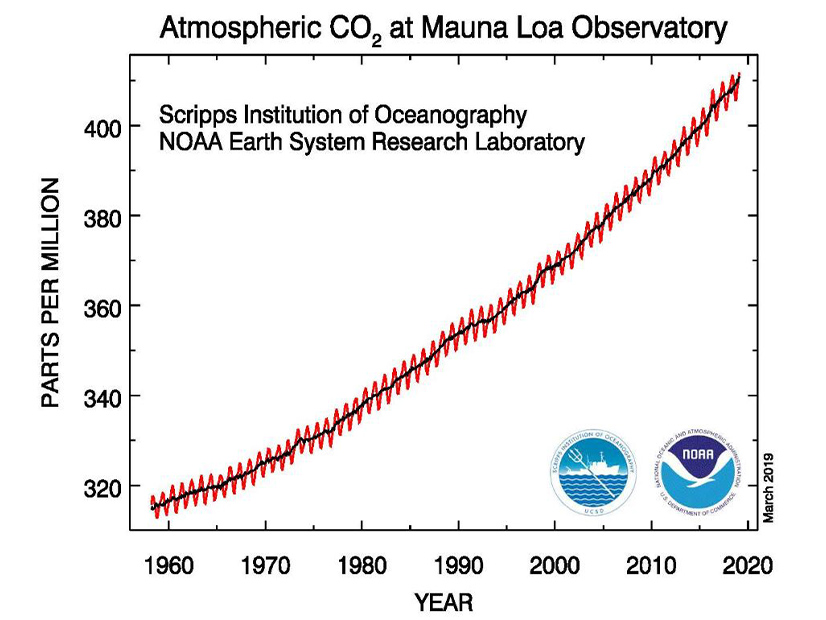
By Kenneth W. Costello
Climate change presents a daunting challenge for economists, political scientists and policymakers: It features a global shared resource (namely, the atmosphere) magnified by massive uncertainty over both physical and economic processes; everyone contributes to its cause, and everyone potentially bears the costs of its consequences.
Three policy challenges ensue: (1) taking collective action, where cooperation of countries is essential to achieve targeted reductions in greenhouse gas emissions, (2) incentivizing individuals and businesses to reduce their GHG emissions, and (3) identifying the preferred institutional arrangement — namely, markets versus government — to alleviate the damages from climate change.
A major problem is that when one country benefits from initiating reductions in GHG emissions, other countries also benefit. The reality that controlling climate change in one country cannot deprive others of the benefits motivates individual countries to avoid paying for mitigation, creating the problem of what economists call free ridership.
Since changes in GHG emissions affect the entire world, any successful coordination would require virtual unanimity rather than just coalition building. But as past experience has shown, reaching mutual consent among multiple heterogenous countries is a Herculean task. (How many U.N. Climate Change Conferences have we had? I lost count.)
Policymakers confront the task of trading off the risk of doing too little to combat climate change with excessive spending or regulating. The ideal policy position on climate change depends critically on the size and likelihood of negative outcomes, considering the best available scientific and other fact-based evidence.
Reasonable people can disagree over the cost of an overly active climate strategy versus the cost of a passive one. Disagreement starts with the credibility of the scientific evidence. People may question the sureness of the scientific evidence. They may also have trouble distinguishing scientifically sound evidence from advocacy evidence.
Disagreement may then shift to the relevance of this evidence for public policy. Here, self-interest motives and ideology play key roles. People tend to adhere to their prior beliefs irrespective of the scientific evidence. These beliefs carry over to the relative costs they place on an overly aggressive climate policy relative to an overly passive policy. All of these factors contribute to the difficulty of reaching political consensus.
For example, the preferred strategy depends (among other things) on people’s risk aversion to the damage that climate change can cause. Some people may struggle more with an incorrect scientific conclusion that climate change has a high risk when in fact it has a low risk; the opportunity cost is in the form of excessive resources allocated to slowing climate change, which inevitably results in lower economic growth and other social costs.
Climate policy certainly falls into a space where government action could very likely have bad consequences. This is especially true for green subsidies for renewable energy and energy efficiency, which although widely popular likely fails a cost-benefit test.
Subsidies encourage rent seeking by special interests and allow policy makers to determine which technologies to champion. Subsidies for renewable energy have been especially attractive because of their claim to improve air quality and create new jobs, while their costs are concealed in the larger government budget. It is harder to sell the public on, say, a carbon tax whose costs are more visible and concentrated on consumers.
Economists consider subsidies for almost anything to be economically inefficient, usually politically motivated, and lasting too long. Their preference is to have the government reallocate funds for basic research. But, not surprisingly, political forces have given higher priority to existing clean technologies with their strong lobbyists than to potentially future ones.
Rent seeking in the form of exploiting government to gain favors tends to concentrate the benefits to these groups while spreading the costs to the general population. A good example is interest groups pressuring state utility regulators and legislatures to use subsidies funded by utility customers and taxpayers to promote energy efficiency, distributed generation, electric vehicles, and other clean-energy technologies.
This inevitably leads to cost subsidization, which (among other things) is unfair to both utility customers and taxpayers who do not benefit. Unfortunately, the evidence confirms that an increasing number of states have been at the vanguard of bad policies that have inflicted a regressive-tax-type wound on lower income people. The reason is that lower-income households spend a larger percentage of their incomes on electricity, and these policies tend to increase electricity prices. For the electric industry, an obsession with climate change threatens policy objectives long adhered to by state utility regulators.
But isn’t it also true that a fixation with climate change, bordering on irrational climate hypochondria, can deprive impoverished people, especially in less-developed countries, of the resources required for survival or progress? This makes little economic sense and reflects the insensitivity to the plight of poor people from those in wealthy countries absorbed with climate change and renewable energy, and the ridding of fossil fuels. Fossil fuels have been a vital factor in the economic growth of less developed countries. There is a serious “equity” problem here.
Relevant to climate action is also the intergenerational issue of whether people today should sacrifice under an aggressive climate policy to benefit people in the far-out future, who are likely to have a much higher standard of living. Some climate activists view anything less than an all-out effort to attack climate change as a social injustice.
In economics, public choice theory predicts that government, composed of bureaucrats and politicians, lacks the necessary information and the right incentives to pursue policies that are in the public good.
We see numerous real-world examples where actual public policies in all areas of society deviate far from what so-called “blackboard economics” would say is ideal. Such divergence typically results from information deficiencies, institutional realities, and the government’s incentive to serve its self-interest and appease special interests rather than the public good. Can we then expect any climate policy dominated by interest-group politics to be in the public good? What we have seen up to now says no.
Either for ideological or monetary reasons, climate advocates want to shape future climate policy, and the sooner the better. Their self-interest motive benefits only themselves, not the broader public interest. Their vision of the future entails filling up their pockets (e.g., clean-energy vendors) or satisfying their followed doctrine (e.g., environmentalists). They have relentlessly lobbied politicians and bureaucrats at all levels of government for special favors. This reality by itself warrants nongovernmental options to address climate change.
Given the problems faced by government-driven climate policy — a particular one that I have mentioned is subsidies for clean energy — more attention should focus on measures that strengthen market signals for individuals to adapt to climate change. These measures may include adaptation based on the pricing mechanism, companies satisfying the demands of consumers and investors for clean products, and governmental assistance for basic research in clean-energy technologies (for instance, nuclear power, renewable energy, and hydropower) and climate engineering. Consumers and investors can reveal their preference for financial assets or products and services that explicitly account for climate change. They have done so already, and we should expect this development to proliferate in the future. But, so far, regretfully market-centric approaches have taken a back seat to government-driven climate policies.
We will surely see in the years ahead more political posturing in mitigating climate change. So much talk and money has been expended on government-driven climate policy. What have we gotten out of it? I would say probably very little in terms of global temperature – no more than a rounding error. Don’t expect things to improve in the future.
The bottom line: spending a lot of money on climate change with status quo policies will likely have a negative social return. The sooner we realize that, the better off we will be.
Kenneth W. Costello is a regulatory economist and independent consultant.



